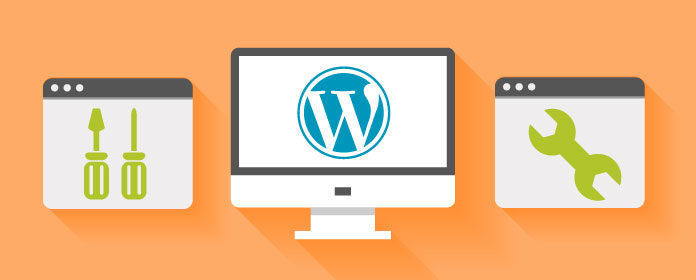WordPress has evolved into a powerful content management system and currently powers more than 19% of the web. And much like a house, once its built, a WordPress website does require some regular maintenance to keep it running smoothly.

While regular maintenance is necessary, it doesn’t require a lot of effort to keep your WordPress site as up to date as necessary by carving out a little bit of time each month to cover the essentials. The degree of maintenance that your WordPress site requires depends on your individual site and personal preferences. But with a little research and help from your web development partner, you can easily figure out what updates are crucial to keep your WordPress site running smoothly and efficient. So here are four basic tips:
Regularly back up the database
Your WordPress website uses a MySQL database that contains every page, post, comment and link on your website. So backing up your WordPress database is critically important in case it becomes corrupted or gets erased altogether, but how often you back it up depends on how comfortable you are with losing a few posts or recent additions. Loss of content often happens for reasons beyond your control; but by doing regular back ups, you can quickly restore your content and keep losses to a minimum. Backups can also be automated using a plugin such as VaultPress so that they run regularly on their own.
Monitor your plugins
Plugins allow site owners to have specific controls over site performance, particularly because they are easy to swap out and exchange for one another. It’s a general rule that the more plugins there are on a WordPress site, the slower the site will be—however, the quality of the plugins plays a big role in how quickly the site is moving as well. If one plug in is slowing your site down, you can find a faster one or remove it all together. More plugins will add more code for a browser to load which can slow it down, so a website with a simple code base will usually load much faster than one with a complicated one. The number of plugins, however, is less important than the quality of them.
Updating plugins can be a bit of a double-edged sword. While the update may implement important security fixes, it may also conflict with another plugin. By doing some research on the plugin homepage, you can learn if other people have had any problems with the update. If everything looks okay, update the plugin and choose the update automatically feature which will then deactivate the old plugin, upload the new code, and activate it again accordingly.
Approach WordPress software updates responsibly
Updates to WordPress increase security, fix bugs, and add new features and functionalities that can be very beneficial. Upgrading WordPress can be as easy as clicking the button in your dashboard, but the implications of upgrading have the potential to negatively affect your website. Sometimes there are unintended consequences of upgrading your WordPress software: broken plugins not compatible with the new version, a loss of customizations, or worse yet, upgrading could break your website altogether.
It’s very important to keep in mind, that the upgrade process will affect all files, plugins and folders included in the main WordPress installation—including all of the core files and code used to run the WordPress site. So it is crucial to approach updates in a responsible manner, ideally applying them in a test environment first and have your website backed up before updating so that anything can easily be restored if an issue arises. Frankly, this makes applying software updates beyond the capability of many companies, making it a much safer bet to work directly with your web development partner before attempting to upgrade.
Perform regular “housekeeping’
Lastly, it’s a good practice to regularly perform some basic “housekeeping†chores on your WordPress website. After all, you want the front-end and back-end of your website to stay neat, organized and running smoothly and efficiently. Some of these housekeeping chores include:
• Checking for broken links
• Deleting spam comments
• Removing disabled plugins and inactive themes
• Deleting duplicate/unused images and files
• Changing your admin passwords
Building the time into your schedule to regularly backup your WordPress database, monitor your plugins, investigate the updates and performing regular housekeeping on your WordPress website will ensure that your site stays running safely and smoothly. With just a little bit of time and commitment, your website will be safeguarded against potential problems.
This article originally appeared on Spur Marketing Blog – circle S studio and has been republished with permission.
Find out how to syndicate your content with Business 2 Community.
Related White Papers
GigaOm Research: A New Charter for HR
The Customer Service Balancing Act
Becoming A Social Business: Integrating Social Software Throughout The Enterprise
Article source: http://www.business2community.com/online-marketing/maintaining-wordpress-website-marketers-need-know-0793323

